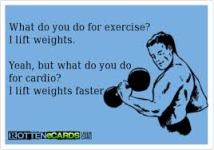
It used to be that I spent time with runners who only ran, cyclists who only rode bikes, and triathletes who wildly mixed it up a bit on the endurance exercise front. But none of them, or almost none of them, lifted weights. Maybe on the off season, maybe. But even then only reluctantly in service of their chosen sport.
These days I’m hanging with some weight lifters who eschew cardio. See comics above and below!
Is it really true that the efforts of one work against the other? (Tracy is going to post later about endurance exercise and the goal of fat loss.)
It seems obviously true that at the outer limits it’s true that these goals can compete. Marathon and ultra-marathoners are small people usually. Extra weight, even in the form of muscle, just makes the job harder. Upper body muscles have no place on the bodies of cyclists who specialize in hill climbing.
Here’s an excerpt from a New York Times piece on size and athletic performance. Note though that a fair amount of this is self-selection. It’s true that elite runners are small but not necessarily true that running made them small.
“The rules of physics say that distance cycling and distance running are for small people. Rowing and swimming are for people who are big. The physics is so exact that when Dr. Secher tried to predict how fast competitive rowers could go, based only on their sizes and the weights of their boats, he was accurate to within 1 percent.
At first glance, a big rower (and elite male rowers can weigh as much as 250 pounds) may seem to be at a disadvantage trying to row hard enough to push a boat through the water. But because water buoys the boat, weight becomes less of an issue compared with the enormous benefits of having strong muscles.”
The same reasoning explains why elite swimmers are big. Great male swimmers often are 6 feet 4 inches tall, and muscular. And because of the advantage that large muscles give for sprints over short distances, the shorter the distance an athlete must swim, the greater the advantage it is to be big.
Tall swimmers also have another advantage: because swimmers are horizontal in the water, their long bodies give them an automatic edge. “It’s the difference between long canoes and short canoes,” Dr. Joyner said.
Distance running is different. Tall people naturally have longer strides, but stride length, it turns out, does not determine speed. Running requires that you lift your body off the ground with each step, propelling yourself forward. The more you weigh, the harder you have to work to lift your body and the slower you will be.
The best runners are small and light, with slim legs. “If you have large legs, you have to move a big load,” Dr. Secher said. “The smaller you are, the better you are.”
See Bigger is better, except when it’s not
Here’s Fit and Feminist blogging about regretfully losing muscle while marathon training:
I will also cop to feeling frustrated that I’ve lost some of my upper body muscle, even though I made a point to lift at least twice a week and to increase my caloric intake to compensate for the calories burned off by my runs. In fact, I ended up actually losing weight, which is basically unheard of during marathon training. The fact that this happened has led me to another realization, which is that while I really love and admire well-developed upper bodies and would love to have one of my own, I have come to the realization that I am not one of those people whose bodies can accommodate a lot of running AND have big, beautiful muscles. So I am still focused on lifting, but it’s also with the understanding that I might not have gorgeous muscles to go along with the strength I build. *sad trombone*
And for people interested in growing muscle, whether for strength training for body building, it’s true that running, biking, swimming marathon type distances can work against your newly built muscle.
But happily most of us aren’t performance oriented ultra-runners or only interested in the size of our muscles. Most of us are middle of the pack athletes, running middle distances and lifting weights for strength and health reasons. For us, it’s a mistake to be distracted about what’s true for those with single minded fitness goals.
I’m a Jill of all sports and I’m okay with that even if it means I don’t do as well in any one as I would do if I did only that thing.
See you in the weight room, on the soccer field, out running, biking, or rowing, in the dojo, or on the cross country ski trails!
